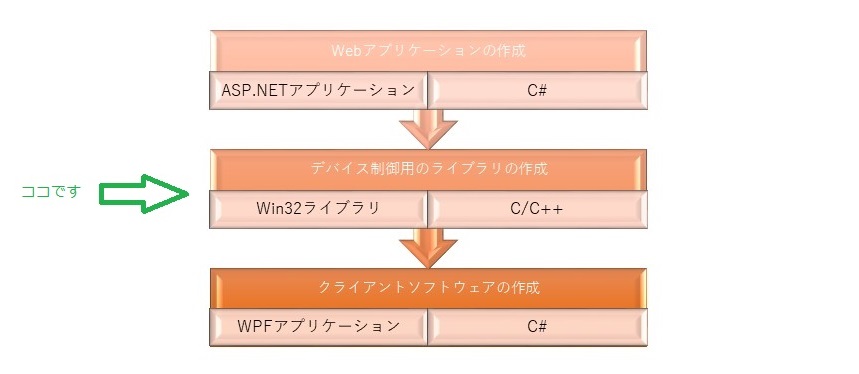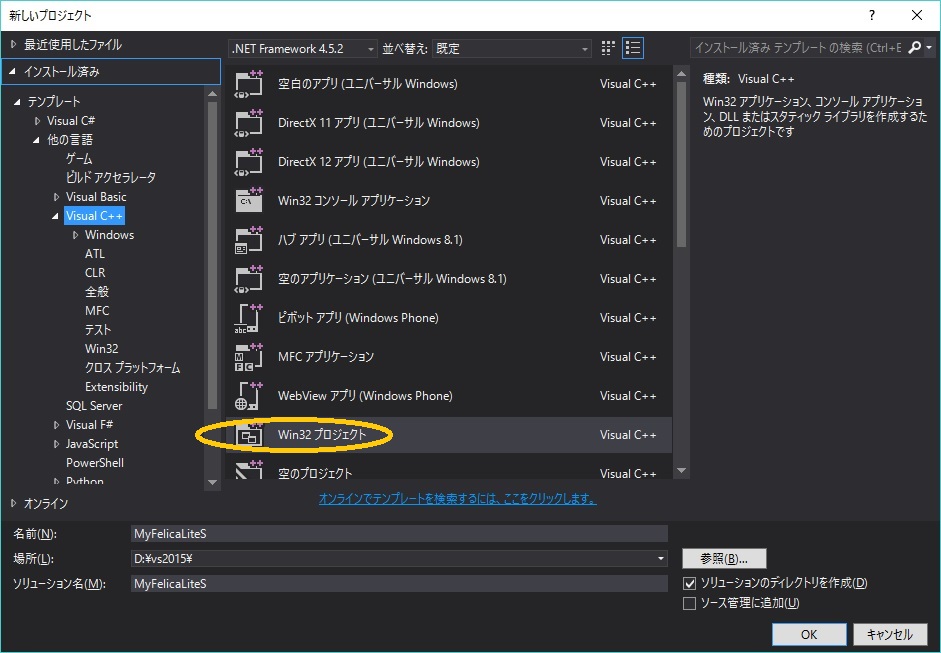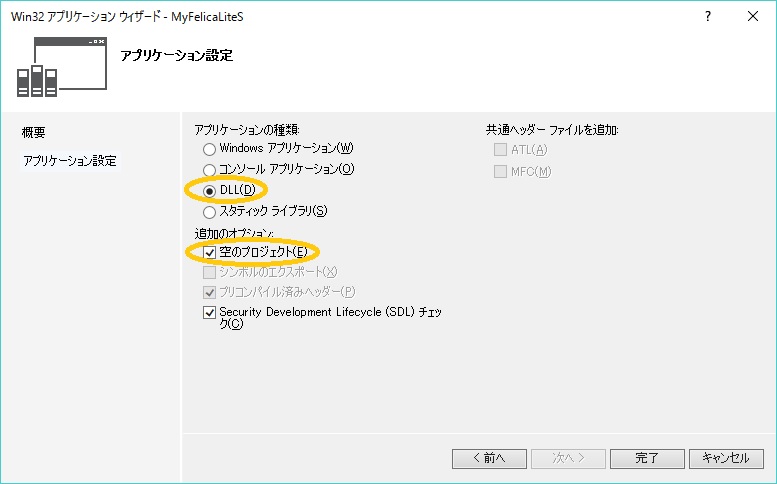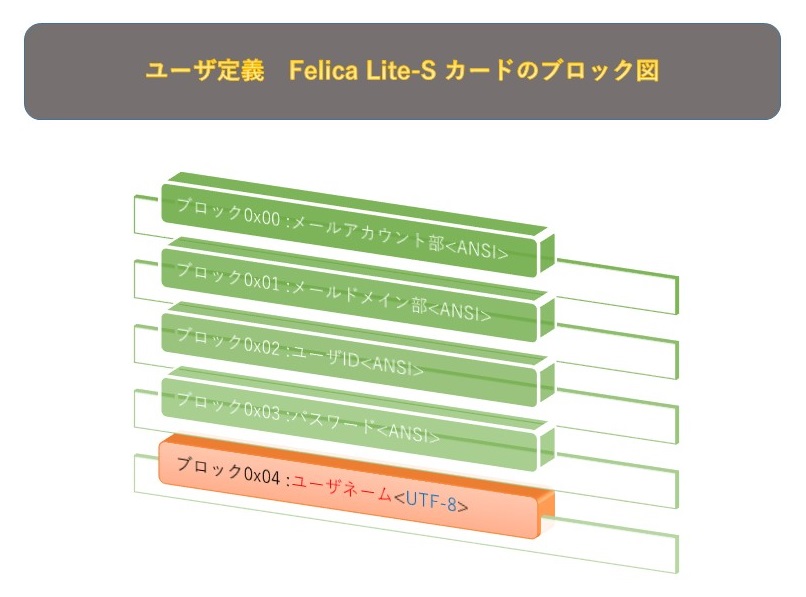Felicaリーダ及びメール送信トリガーの作成(Felica編)
GitHub
Felicaのカードリーダにアクセスするアンマネージのライブラリを作ります。
C/C++言語での実装です。
ヘッダーファイル:FelicaRW.h
#pragma once
#include <Windows.h>
#include "felica_nfc_library.h"
#pragma comment(lib ,"felica_nfc_library.lib")
#pragma warning(disable : 4996)
class Felica
{
private:
// FelicaRW
#define IDM_SIZE (8) // IDm のサイズ
#define BLOCK_SIZE (16) // ブロック(読み書きの最小単位)のサイズ
#define SYSTEM_CODE (0x88b4) // 0x88b4 = FeliCa Lite-S のシステムコード
#define SERVICE_CODE_RW (0x0009) // 0x0009 = Random Read/Write のサービスコード
#define SERVICE_CODE_RO (0x000B) // 0x000B = Random Read Only のサービスコード
public:
bool PrintNfcLastErr(char* pFuncName);
bool MyPrintHex(unsigned char *pBuf, int iLen);
bool MyPolling(unsigned short usSystemCode, unsigned char pIDm[IDM_SIZE]);
bool MyWriteWithoutEncryption(unsigned char *pIDm, unsigned short usServiceCode, unsigned char ucBlockOffset, unsigned char *pDataW);
bool MyReadWithoutEncryption(unsigned char *pIDm, unsigned short usServiceCode, unsigned char ucBlockOffset, unsigned char *pDataR);
void FelicaRW_main(int block, unsigned char* wData, bool read);
void SetData();
unsigned char* GetData();
unsigned char* GetName();
};
インプリメンテーションファイル:FelicaRW.cpp
このクラス関数の定義ファイルは、すでにWeb上で公開されているコードを改変して作ったものです。
このサイトはFelicaを扱うにあたって、とても参考になります。時間があるときに是非一読されることをおススメします。
// FelicaRW.cpp : 実装ファイル
//
#include <stdio.h>
#include <stdlib.h>
#include <string.h>
#include "FelicaRW.h"
#pragma warning(disable : 4996)
// FelicaRW
unsigned char account[16];
unsigned char domain[16];
unsigned char user_id[16];
unsigned char password[16];
unsigned char str[100];
unsigned char name[16];
unsigned char* ustrcat(unsigned char *dest, const unsigned char *src) {
unsigned int length_1 = 0;
unsigned int length_2 = 0;
// find the end of the first unsigned char string
for (; dest[length_1] != '\0'; length_1++);
//input unsigned chars into the string from that position to the end
for (; src[length_2] != '\0'; length_2++)
dest[length_1 + length_2] = src[length_2];
// place a NULL terminating character at the end
dest[length_1 + length_2] = '\0';
return dest;
}
unsigned char* Felica::GetName()
{
return name;
}
unsigned char* Felica::GetData()
{
return str;
}
void Felica::SetData()
{
strcpy((char*)str, (char*)account);
strcat((char*)str, ",");
strcat((char*)str, (char*)domain);
strcat((char*)str, ",");
strcat((char*)str, (char*)user_id);
strcat((char*)str, ",");
strcat((char*)str, (char*)password);
}
bool Felica::PrintNfcLastErr(char* pFuncName)
{
unsigned long pErrInfo[2];
bool bSuccess;
bSuccess = felicalib_nfc_get_last_error(pErrInfo);
if (bSuccess)
{
printf("%s でエラー発生 [%x, %x].\n",
pFuncName,
pErrInfo[0], // NFCアクセスライブラリエラーコード
pErrInfo[1]); // ドライバエラーコード
}
else
{
printf("%s でエラー発生. エラー情報取得失敗.\n",
pFuncName);
}
return true;
}
bool Felica::MyPrintHex(unsigned char *pBuf, int iLen) {
char buf[16];
for (int i = 0; i < iLen; i++)
{
sprintf(buf, "%02x ", pBuf[i]);
//strcat(po, buf);
}
sprintf(buf, "%s", "\r\n");
//strcat(po, buf);
return true;
}
bool Felica::MyPolling(unsigned short usSystemCode,
unsigned char pIDm[IDM_SIZE]) {
bool bSuccess;
// Polling コマンドの組み立て
unsigned char pCom[] = {
0x00, // データ長
0x00, // コマンドコード
0x00, 0x00, // システムコード
0x00, // リクエストコード
0x00 // タイムスロット
};
unsigned char pRes[512];
unsigned short usComLen = sizeof(pCom);
unsigned short usResLen = sizeof(pRes);
pCom[0] = sizeof(pCom);
pCom[2] = usSystemCode >> 8;
pCom[3] = usSystemCode & 0xFF;
// コマンドの発行
bSuccess = felicalib_nfc_thru(pCom, usComLen, pRes, &usResLen);
if (!bSuccess)
{
PrintNfcLastErr("felicalib_nfc_thru(polling)");
return false;
}
// レスポンスのチェック
if (usResLen != 1 + 1 + 8 + 8)
{
printf("polling のレスポンス長 %d が不正 #1\n", usResLen);
return false;
}
if (pRes[0] != 1 + 1 + 8 + 8)
{
printf("polling のレスポンス長 %d が不正 #2\n", pRes[0]);
return false;
}
if (pRes[1] != 0x01)
{
printf("polling のレスポンスコード %d が不正\n", pRes[1]);
return false;
}
// IDm のコピー
memcpy_s(pIDm, IDM_SIZE, &pRes[2], IDM_SIZE);
return true;
}
/*
bSuccess = MyWriteWithoutEncryption(
pIDm, // Polling コマンドで取得した IDm IN
SERVICE_CODE_RW, // サービスコード IN
pBlockNum[iBlockCount], // ブロック番号 IN
pDataR); // 読み出したデータの格納場所 OUT
*/
bool Felica::MyWriteWithoutEncryption(unsigned char *pIDm,
unsigned short usServiceCode,
unsigned char ucBlockOffset,
unsigned char *pDataW) {
bool bSuccess;
// Write Without Encryption コマンドの組み立て
unsigned char pCom[] = {
0x00, // データ長
0x08, // コマンドコード
0x00, 0x00, 0x00, 0x00, 0x00, 0x00, 0x00, 0x00, // IDm
0x01, // サービス数
0x00, 0x00, // サービスコード
0x01, // ブロック数
0x00, 0x00, 0x00, // ブロック
0x00, 0x00, 0x00, 0x00, 0x00, 0x00, 0x00, 0x00, // 任意のデータ
0x00, 0x00, 0x00, 0x00, 0x00, 0x00, 0x00, 0x00 // 任意のデータ
};
unsigned char pRes[512];
unsigned short usComLen = sizeof(pCom);
unsigned short usResLen = sizeof(pRes);
pCom[0] = sizeof(pCom);
memcpy_s(&pCom[2], sizeof(pCom) - 2, pIDm, IDM_SIZE);
pCom[11] = usServiceCode & 0xFF;
pCom[12] = usServiceCode >> 8;
pCom[15] = ucBlockOffset;
memcpy_s(&pCom[17], sizeof(pCom) - 17, pDataW, BLOCK_SIZE);
// コマンドの発行
bSuccess = felicalib_nfc_thru(pCom, usComLen, pRes, &usResLen);
if (!bSuccess)
{
PrintNfcLastErr("felicalib_nfc_thru(write without encryption)");
return false;
}
// レスポンスのチェック
if (usResLen != 1 + 1 + 8 + 1 + 1)
{
printf("write w/o enc のレスポンス長 %d が不正 #1\n", usResLen);
return false;
}
if (pRes[0] != 1 + 1 + 8 + 1 + 1)
{
printf("write w/o enc のレスポンス長 %d が不正 #2\n", pRes[0]);
return false;
}
if (pRes[1] != 0x09)
{
printf("write w/o enc のレスポンスコード %d が不正\n", pRes[1]);
return false;
}
if (pRes[10] != 0x00)
{
printf("write w/o enc のステータスフラグが [%02x, %02x] のエラー\n", pRes[10], pRes[11]);
return false;
}
return true;
}
bool Felica::MyReadWithoutEncryption(unsigned char *pIDm,
unsigned short usServiceCode,
unsigned char ucBlockOffset,
unsigned char *pDataR) {
bool bSuccess;
// Read Without Encryption コマンドの組み立て
unsigned char pCom[] = {
0x00, // データ長
0x06, // コマンドコード
0x00, 0x00, 0x00, 0x00, 0x00, 0x00, 0x00, 0x00, // IDm
0x01, // サービス数
0x00, 0x00, // サービスコード
0x01, // ブロック数
0x00, 0x00, 0x00 // ブロック
};
unsigned char pRes[512];
unsigned short usComLen = sizeof(pCom);
unsigned short usResLen = sizeof(pRes);
pCom[0] = sizeof(pCom);
memcpy_s(&pCom[2], sizeof(pCom) - 2, pIDm, IDM_SIZE);
pCom[11] = usServiceCode & 0xFF;
pCom[12] = usServiceCode >> 8;
pCom[15] = ucBlockOffset;
// コマンドの発行
bSuccess = felicalib_nfc_thru(pCom, usComLen, pRes, &usResLen);
if (!bSuccess)
{
PrintNfcLastErr("felicalib_nfc_thru(read without encryption)");
return false;
}
// レスポンスのチェック
if (usResLen < 1 + 1 + 8 + 1 + 1)
{
printf("read w/o enc のレスポンス長 %d が不正 #1\n", usResLen);
return false;
}
if (pRes[0] < 1 + 1 + 8 + 1 + 1)
{
printf("read w/o enc のレスポンス長 %d が不正 #2\n", pRes[0]);
return false;
}
if (pRes[1] != 0x07)
{
printf("read w/o enc のレスポンスコード %d が不正\n", pRes[1]);
return false;
}
if (pRes[10] != 0x00)
{
printf("read w/o enc のステータスフラグが [%02x, %02x] のエラー\n", pRes[10], pRes[11]);
return false;
}
// 読み出したデータのコピー
memcpy_s(pDataR, BLOCK_SIZE, &pRes[13], BLOCK_SIZE);
return true;
}
unsigned char* Felica::FelicaRW_main(int block, unsigned char* wData, bool read)
{
//strcpy(po, "IDm = ");
bool bSuccess;
unsigned char pIDm[IDM_SIZE];
// ライブラリの初期化
bSuccess = felicalib_nfc_initialize();
if (!bSuccess)
{
PrintNfcLastErr("felicalib_nfc_initialize");
goto L_End;
}
// ポートのオープン
char szPort[16] = "";
bSuccess = felicalib_nfc_open(szPort);
if (!bSuccess)
{
PrintNfcLastErr("felicalib_nfc_open");
goto L_Uninitialize;
}
printf("port=%s\n", szPort);
// デバイスの補足とアクセス権の取得
DEVICE_INFO *pInfo;
bSuccess = felicalib_nfc_poll_and_start_dev_access(
DEVICE_TYPE_NFC_18092_212K // FeliCa 212kbps
| DEVICE_TYPE_NFC_18092_424K, // FeliCa 424kbps
3000, // タイムアウト ms
&pInfo);
if (!bSuccess)
{
PrintNfcLastErr("felicalib_nfc_poll_and_start_dev_access");
goto L_Close;
}
// IDm の表示
DEVICE_DATA_NFC_18092_212_424K *pf;
pf = (DEVICE_DATA_NFC_18092_212_424K *)pInfo->dev_info;
printf("IDm=");
MyPrintHex(pf->NFCID2, IDM_SIZE);
// Polling コマンド発行
bSuccess = MyPolling(SYSTEM_CODE, pIDm);
if (!bSuccess)
{
goto L_StopDevAccess;
}
int pBlockNum[] =
{
0x00, 0x01, 0x02, 0x03, 0x04, 0x05, 0x06, 0x07,
0x08, 0x09, 0x0a, 0x0b, 0x0c, 0x0d, 0x0e,
0x82, 0x83, 0x84, 0x85, 0x86, 0x87,
0x88,
};
char *pBlockName[] =
{
"S_PAD0", "S_PAD1", "S_PAD2", "S_PAD3", "S_PAD4", "S_PAD5", "S_PAD6", "S_PAD7",
"S_PAD8", "S_PAD9", "S_PAD10", "S_PAD11", "S_PAD12", "S_PAD13", "REG",
"ID", "D_ID", "SER_C", "SYS_C", "CKV", "CK",
"MC",
};
if (true == read)
{
bSuccess = MyReadWithoutEncryption(
pIDm, // Polling コマンドで取得した IDm
SERVICE_CODE_RO, // サービスコード
pBlockNum[0], // ブロック番号
account); // 読み出したデータの格納場所
bSuccess = MyReadWithoutEncryption(
pIDm, // Polling コマンドで取得した IDm
SERVICE_CODE_RO, // サービスコード
pBlockNum[1], // ブロック番号
domain); // 読み出したデータの格納場所
bSuccess = MyReadWithoutEncryption(
pIDm, // Polling コマンドで取得した IDm
SERVICE_CODE_RO, // サービスコード
pBlockNum[2], // ブロック番号
user_id); // 読み出したデータの格納場所
bSuccess = MyReadWithoutEncryption(
pIDm, // Polling コマンドで取得した IDm
SERVICE_CODE_RO, // サービスコード
pBlockNum[3], // ブロック番号
password); // 読み出したデータの格納場所
bSuccess = MyReadWithoutEncryption(
pIDm, // Polling コマンドで取得した IDm
SERVICE_CODE_RO, // サービスコード
pBlockNum[4], // ブロック番号
name); // 読み出したデータの格納場所
SetData();
}
else
{
unsigned char pDataW[16] =
{
0x00, 0x00, 0x00, 0x00, 0x00, 0x00, 0x00, 0x00,
0x00, 0x00, 0x00, 0x00, 0x00, 0x00, 0x00, 0x00
};
MyWriteWithoutEncryption(
pIDm,
SERVICE_CODE_RW, //usServiceCode,
block, //ucBlockOffset,
wData);
}
L_StopDevAccess:
// デバイス使用権の解放
bSuccess = felicalib_nfc_stop_dev_access(
RE_NOTIFICATION_SAME_DEVICE);
if (!bSuccess)
{
PrintNfcLastErr("felicalib_nfc_stop_dev_access");
}
// デバイス捕捉処理の停止
bSuccess = felicalib_nfc_stop_poll_mode();
if (!bSuccess)
{
PrintNfcLastErr("felicalib_nfc_stop_poll_mode");
}
L_Close:
// ポートのクローズ
bSuccess = felicalib_nfc_close();
if (!bSuccess)
{
PrintNfcLastErr("felicalib_nfc_close");
}
L_Uninitialize:
// ライブラリの終了処理
bSuccess = felicalib_nfc_uninitialize();
if (!bSuccess)
{
PrintNfcLastErr("felicalib_nfc_uninitialize");
}
L_End:
return 0;
}
DEFファイル:MyFelicaLiteS.def
LIBRARY
EXPORTS
FelicaRW_main @1
GetData @2
GetName @3
1.Visual Studioで、win32のプロジェクトを作ります。
2.空のライブラリを選択します。
アプリケーションの種類で、"DLL"を選択し、追加のオプションで"空のプロジェクト"をチェックしてください。
3.ファイルを作り編集する。
ヘッダーファイル(FelicaRW.h)、
インプリメンテーションファイル(FelicaRW.cpp)、
DEFファイル(MyFelicaLiteS.def)
を追加します。
名前は、任意ですが、以後統一名称として話を進めますので、異なる名称を付けた場合には読み替えてください。
4.ビルドして、DLL形式のライブラリファイルを作ってください。
1.コーディング解説
実装:FelicaMail.aspx.cs
void Felica::FelicaRW_main(int block, unsigned char* wData, bool read)
{
//strcpy(po, "IDm = ");
bool bSuccess;
unsigned char pIDm[IDM_SIZE];
// ライブラリの初期化
bSuccess = felicalib_nfc_initialize();
if (!bSuccess)
{
PrintNfcLastErr("felicalib_nfc_initialize");
goto L_End;
}
// ポートのオープン
char szPort[16] = "";
bSuccess = felicalib_nfc_open(szPort);
if (!bSuccess)
{
PrintNfcLastErr("felicalib_nfc_open");
goto L_Uninitialize;
}
printf("port=%s\n", szPort);
// デバイスの補足とアクセス権の取得
DEVICE_INFO *pInfo;
bSuccess = felicalib_nfc_poll_and_start_dev_access(
DEVICE_TYPE_NFC_18092_212K // FeliCa 212kbps
| DEVICE_TYPE_NFC_18092_424K, // FeliCa 424kbps
3000, // タイムアウト ms
&pInfo);
if (!bSuccess)
{
PrintNfcLastErr("felicalib_nfc_poll_and_start_dev_access");
goto L_Close;
}
// IDm の表示
DEVICE_DATA_NFC_18092_212_424K *pf;
pf = (DEVICE_DATA_NFC_18092_212_424K *)pInfo->dev_info;
printf("IDm=");
MyPrintHex(pf->NFCID2, IDM_SIZE);
// Polling コマンド発行
bSuccess = MyPolling(SYSTEM_CODE, pIDm);
if (!bSuccess)
{
goto L_StopDevAccess;
}
int pBlockNum[] =
{
0x00, 0x01, 0x02, 0x03, 0x04, 0x05, 0x06, 0x07,
0x08, 0x09, 0x0a, 0x0b, 0x0c, 0x0d, 0x0e,
0x82, 0x83, 0x84, 0x85, 0x86, 0x87,
0x88,
};
char *pBlockName[] =
{
"S_PAD0", "S_PAD1", "S_PAD2", "S_PAD3", "S_PAD4", "S_PAD5", "S_PAD6", "S_PAD7",
"S_PAD8", "S_PAD9", "S_PAD10", "S_PAD11", "S_PAD12", "S_PAD13", "REG",
"ID", "D_ID", "SER_C", "SYS_C", "CKV", "CK",
"MC",
};
if (true == read)
{
bSuccess = MyReadWithoutEncryption(
pIDm, // Polling コマンドで取得した IDm
SERVICE_CODE_RO, // サービスコード
pBlockNum[0], // ブロック番号
account); // 読み出したデータの格納場所
bSuccess = MyReadWithoutEncryption(
pIDm, // Polling コマンドで取得した IDm
SERVICE_CODE_RO, // サービスコード
pBlockNum[1], // ブロック番号
domain); // 読み出したデータの格納場所
bSuccess = MyReadWithoutEncryption(
pIDm, // Polling コマンドで取得した IDm
SERVICE_CODE_RO, // サービスコード
pBlockNum[2], // ブロック番号
user_id); // 読み出したデータの格納場所
bSuccess = MyReadWithoutEncryption(
pIDm, // Polling コマンドで取得した IDm
SERVICE_CODE_RO, // サービスコード
pBlockNum[3], // ブロック番号
password); // 読み出したデータの格納場所
bSuccess = MyReadWithoutEncryption(
pIDm, // Polling コマンドで取得した IDm
SERVICE_CODE_RO, // サービスコード
pBlockNum[4], // ブロック番号
name); // 読み出したデータの格納場所
SetData();
}
else
{
unsigned char pDataW[16] =
{
0x00, 0x00, 0x00, 0x00, 0x00, 0x00, 0x00, 0x00,
0x00, 0x00, 0x00, 0x00, 0x00, 0x00, 0x00, 0x00
};
MyWriteWithoutEncryption(
pIDm,
SERVICE_CODE_RW, //usServiceCode,
block, //ucBlockOffset,
wData);
}
L_StopDevAccess:
// デバイス使用権の解放
bSuccess = felicalib_nfc_stop_dev_access(
RE_NOTIFICATION_SAME_DEVICE);
if (!bSuccess)
{
PrintNfcLastErr("felicalib_nfc_stop_dev_access");
}
// デバイス捕捉処理の停止
bSuccess = felicalib_nfc_stop_poll_mode();
if (!bSuccess)
{
PrintNfcLastErr("felicalib_nfc_stop_poll_mode");
}
L_Close:
// ポートのクローズ
bSuccess = felicalib_nfc_close();
if (!bSuccess)
{
PrintNfcLastErr("felicalib_nfc_close");
}
L_Uninitialize:
// ライブラリの終了処理
bSuccess = felicalib_nfc_uninitialize();
if (!bSuccess)
{
PrintNfcLastErr("felicalib_nfc_uninitialize");
}
L_End:
return 0;
}
FelicaRW_main(int block, unsigned char* wData, bool read)の引数リストは以下のようになっています。
int block … 読み込み、又は書き込みをするブロックを指定します。
char* wData … 書き込みをする場合、Felicaに書き込みたい文字列を指定します。
bool read … 読み込みをする場合にはtrueを、書き込みをする場合にはfalseを指定します。
上図は、Felica Lite-Sのブロックイメージです。ユーザ定義で自由にデザインできますが、今回はこのように定義しました。
- 0x00ブロック---メールアカウント部
- 0x01ブロック---メールドメイン部
- 0x02ブロック---ユーザID
- 0x03ブロック---パスワード
- 0x04ブロック---ユーザネーム
いづれのブロックも最大長が16バイトで、特に注意すべき点は、ユーザネーム。
ユーザネームは、マルチバイト(Unicode)でエンコードします。
次工程のトリガー編で、このライブラリを利用するアプリケーションがポインタを受け取るときにUnicodeとして引き取るので、
漢字やひらがな等の日本語をUnicodeで書き込むことを覚えておいてください。
unsigned char* Felica::GetName()
{
return name;
}
unsigned char* Felica::GetData()
{
return str;
}
上記で説明した通り、ライブラリを使用するアプリケーション側のポインタ文字列の受け方が異なるため、
ゲッターを二つに分けて利用します。
以上となります。




